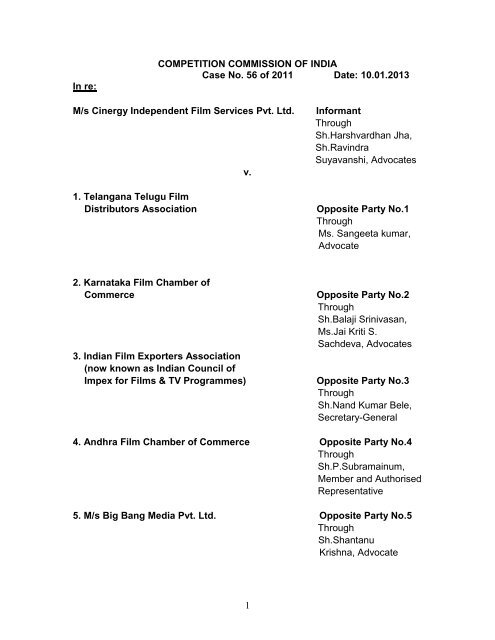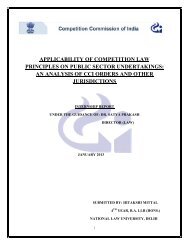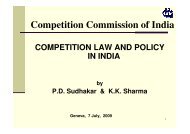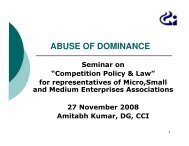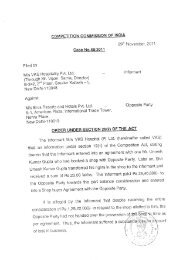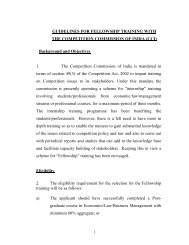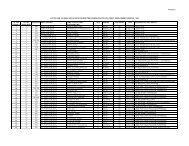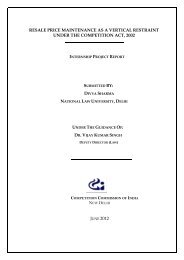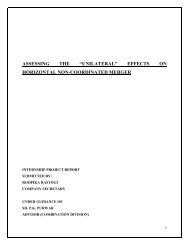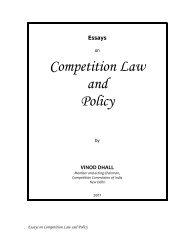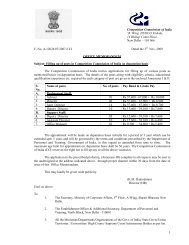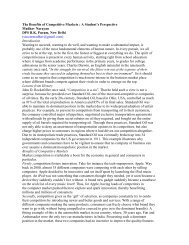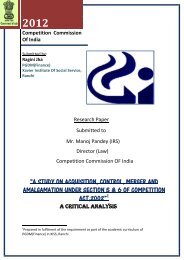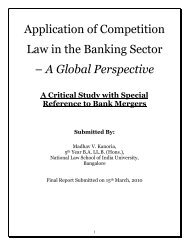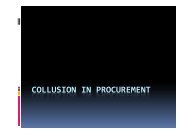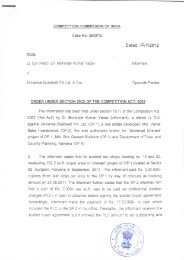M/s Cinergy Independent Film Services Pvt. Ltd - Competition ...
M/s Cinergy Independent Film Services Pvt. Ltd - Competition ...
M/s Cinergy Independent Film Services Pvt. Ltd - Competition ...
Create successful ePaper yourself
Turn your PDF publications into a flip-book with our unique Google optimized e-Paper software.
In re:<br />
COMPETITION COMMISSION OF INDIA<br />
Case No. 56 of 2011 Date: 10.01.2013<br />
M/s <strong>Cinergy</strong> <strong>Independent</strong> <strong>Film</strong> <strong>Services</strong> <strong>Pvt</strong>. <strong>Ltd</strong>. Informant<br />
Through<br />
Sh.Harshvardhan Jha,<br />
Sh.Ravindra<br />
Suyavanshi, Advocates<br />
v.<br />
1. Telangana Telugu <strong>Film</strong><br />
Distributors Association Opposite Party No.1<br />
Through<br />
Ms. Sangeeta kumar,<br />
Advocate<br />
2. Karnataka <strong>Film</strong> Chamber of<br />
Commerce Opposite Party No.2<br />
Through<br />
Sh.Balaji Srinivasan,<br />
Ms.Jai Kriti S.<br />
Sachdeva, Advocates<br />
3. Indian <strong>Film</strong> Exporters Association<br />
(now known as Indian Council of<br />
Impex for <strong>Film</strong>s & TV Programmes) Opposite Party No.3<br />
Through<br />
Sh.Nand Kumar Bele,<br />
Secretary-General<br />
4. Andhra <strong>Film</strong> Chamber of Commerce Opposite Party No.4<br />
Through<br />
Sh.P.Subramainum,<br />
Member and Authorised<br />
Representative<br />
5. M/s Big Bang Media <strong>Pvt</strong>. <strong>Ltd</strong>. Opposite Party No.5<br />
Through<br />
Sh.Shantanu<br />
Krishna, Advocate<br />
1
Coram:<br />
Mr. Ashok Chawla<br />
Chairperson<br />
Mr. HC Gupta<br />
Member<br />
Dr. Geeta Gouri<br />
Member<br />
Mr. R. Prasad<br />
Member<br />
Mr. Anurag Goel<br />
Member<br />
Mr. M. L. Tayal<br />
Member<br />
Mr. Justice (retd.) S.N. Dhingra<br />
Member<br />
Order under section 27 of the <strong>Competition</strong> Act, 2002<br />
The present information has been filed under section 19(1)(a) of the<br />
<strong>Competition</strong> Act, 2002 (‘the Act’) by M/s <strong>Cinergy</strong> <strong>Independent</strong> <strong>Film</strong> <strong>Services</strong> <strong>Pvt</strong>.<br />
<strong>Ltd</strong>. (‘the informant’) against M/s Telangana Telugu <strong>Film</strong> Distributors<br />
Association(‘the opposite party No.1’/ TTFDA), M/s Karnataka <strong>Film</strong> Chamber of<br />
Commerce (‘the opposite party No.2’/ KFCA), M/s Indian <strong>Film</strong> Exporters<br />
Association (now known as Indian Council of Impex for <strong>Film</strong>s & TV Programmes)<br />
(‘the opposite party No.3’/ IMPEX), M/s Andhra <strong>Film</strong> Chamber of Commerce (‘the<br />
opposite party No.4’/ AFCC) and M/s Big Bang Media <strong>Pvt</strong>. <strong>Ltd</strong>. (‘the opposite<br />
party No.5’) alleging inter alia contravention of the provisions of sections 3 and 4<br />
of the Act.<br />
2
2. Shorn of details, the informant is a company incorporated under the<br />
Companies Act, 1956 and engaged inter alia in the business of production and<br />
distribution of cinematographic films. The opposite party Nos. 1, 2 and 4 are the<br />
associations of film producers, distributors and exhibitors acting as regulatory<br />
bodies for production, distribution and exhibition of films in their respective<br />
territories. The opposite party No. 3 is an association of distributors engaged in<br />
import and export of Indian films/ TV programmes. The opposite party No. 5 is a<br />
company engaged inter alia in the business of production and distribution of<br />
cinematograph films.<br />
3. It is alleged by the informant that the opposite party associations make it<br />
compulsory for every film distributor to become their member and/or register<br />
his/its film with them before the exhibition of such film. A distributor who refuses<br />
to become a member and/or refuses to register his film with them is not allowed<br />
to distribute and exhibit his/its film in the territory which is governed/ regulated by<br />
the respective opposite party association. The opposite party associations<br />
enforce such compulsion on distributors by threatening their members of serious<br />
consequences for exhibiting films of a distributor who is not a member of any of<br />
the opposite party associations or whose film is not registered with them. On<br />
account of such threats, the cinema exhibitors who are neutral parties are<br />
unwilling to undertake the risk of exhibiting the film of a distributor who is not a<br />
member of the opposite party associations or whose film is not registered with<br />
them. It is further alleged that although the distributors only acquire the theatrical<br />
distribution rights of the films, these associations make those distributors sign<br />
their standard form of registration which has clauses putting an undertaking of<br />
the distributors not to exploit other rights of such film (satellite rights/ home video<br />
rights etc.) for a certain period. It is averred that the distributors of the films have<br />
no choice but to sign these forms even when they don’t have any control over<br />
other rights of such films other than theatrical exploitation rights.<br />
3
4. Coming to the specific grievance of the informant, it is averred that the<br />
opposite party No.1 vide its circular dated 10.09.2011 directed its members not to<br />
release the film ‘Mausam’ slated for release on 16.09.2011, in its territory unless<br />
the claim of its member viz. M/s Suresh Productions <strong>Pvt</strong>. <strong>Ltd</strong>. of Rs.2.5 crores<br />
was settled. The opposite party No. 3 vide its letter dated 10.09.2011 conveyed<br />
to the informant that it would inform its members to intervene in the distribution of<br />
the film ‘Mausam’ until recovery of dues of M/s Suresh Productions <strong>Pvt</strong>. <strong>Ltd</strong>. It is<br />
further averred that the said claim of Rs.2.5 crores was due against one Shri<br />
Madhu Mantena of M/s Big Bang Media <strong>Pvt</strong>. <strong>Ltd</strong>. i.e. the opposite party No. 5<br />
herein in connection with the production of film ‘Rann’. It is, thus, alleged that the<br />
opposite party associations acted malafidely and arbitrarily in boycotting the film<br />
‘Mausam’ with an effort to secure a claim of their member viz., M/s Suresh<br />
Productions <strong>Pvt</strong>. <strong>Ltd</strong>. It is further alleged that Shri D. Suresh Babu, Managing<br />
Director of M/s Suresh Productions <strong>Pvt</strong>. <strong>Ltd</strong>., who is also the President of the<br />
opposite party No.4 misused his position in order to recover the claim against the<br />
opposite party No.5 by preventing the release of the film ‘Mausam’ produced by<br />
the informant.<br />
5. Based on these averments and allegations, the informant has alleged that<br />
the actions of the opposite party associations have contravened the provisions of<br />
section 3 and section 4 of the <strong>Competition</strong> Act, 2002.<br />
6. After considering the information and the material available on record, the<br />
Commission on 15.09.2011 directed the Director General (DG) to conduct an<br />
investigation into the matter and to submit a report. Accordingly, on completion of<br />
the investigation, the Office of the DG submitted its report to the Commission on<br />
05.03.2012.<br />
7. The DG in the report concluded that the allegations relating to<br />
infringement of the provisions of the Act were found to be correct against the<br />
opposite party Nos. 1, 2 and 4. It was noted that the bye laws and conduct of<br />
4
these opposite parties were restrictive in nature and controlled the film<br />
distribution business. In an effort to regulate the film distribution and exhibition in<br />
their respective territories, they have crossed the limits of the activities of an<br />
association and have hampered the process of free competition. The tools<br />
adopted by these associations to settle the disputes between the affected parties<br />
were not found to be in conformity with the law. Instead of creating a legitimate<br />
mechanism to settle the disputes, it was found by the DG that these associations<br />
were coercing the producers/ members to follow their directions. These opposite<br />
parties were found to be indulging in anti-competitive practices with regard to<br />
limiting and controlling provisions of services of film distribution and exhibition.<br />
Further, the opposite party Nos. 1 2 and 4 were found to have restricted the<br />
market of film distribution in their territories by taking decisions to not deal with<br />
film ‘Mausam’ unless their directions are obeyed. The aforesaid anti-competitive<br />
activities of these opposite parties were found to be anti-competitive in<br />
contravention of the provisions of section 3(3)(b) of the Act. However, no<br />
contravention of the provisions of the Act was found against the opposite party<br />
Nos. 3 and 5.<br />
8. The Commission considered the report of the DG in its ordinary meeting<br />
held on 22.03.2012 and vide its order of even date decided to forward copies<br />
thereof to the informant and the opposite parties to file their respective replies/<br />
objections thereto. The copies of the report were also forwarded to the office-<br />
bearers of the opposite party associations.<br />
KFCC<br />
9. KFCC in its reply submitted that it is an association of film producers,<br />
theatre owners and distributors in the State of Karnataka. It is only a regulatory<br />
body in so far as it relates to the production, distribution and exhibition of films by<br />
its members in the territory of Karnataka. It is stated to be affiliated to South<br />
Indian <strong>Film</strong> Chamber of Commerce and <strong>Film</strong> Federation of India which are the<br />
highest bodies regulating production and exhibition of films.<br />
5
10. It has been submitted that the membership of KFCC is voluntary and it is<br />
not compulsory for every film distributor to become its member before exhibition<br />
of films. Further, it is stated that the association has not given any direction to its<br />
members regarding release of the film ‘Mausam’. It has also not imposed any<br />
restriction of any nature on the release and/or exhibition of the said film. The<br />
object of KFCC is to promote the Kannada film industry which is a very small<br />
industry with limited audience being confined only to the State of Karnataka and<br />
is facing the threat of being wiped out owing to the monopolistic capture of the<br />
market by multinational corporations such as the informant herein.<br />
11. KFCC is striving to keep the Kannada film industry running amidst the<br />
huge competition from the multination corporations like the informant. It has been<br />
submitted that as an association it is the duty of KFCC to attend to the<br />
complaints filed by its members and resolve the disputes and it is in connection<br />
with the complaint received by one of its members that KFCC issued a letter<br />
requesting the informant to be present for the arbitration proceedings in order to<br />
resolve the dispute between the informant and its member.<br />
12. KFCC has not issued any direction regarding the release of the film<br />
‘Mausam’ by the informant in its letter. Objection is taken to the finding of the DG<br />
to the effect that KFCC pressurized the producer of the film ‘Mausam’ by issuing<br />
circular/ letters for not dealing with the film or threatening to settle the<br />
outstanding payments of the member and/ or taking decision to not deal with the<br />
film unless the dispute is resolved. Thus, it is urged that there was no basis of the<br />
finding of the DG.<br />
13. The letter was issued by KFCC only with the object to resolve the dispute<br />
amicably and there was no other intention behind issuing the letter which is clear<br />
from the fact that no adverse directive was made by KFCC even though the<br />
informant did not attend the proceedings initiated by it. It is further submitted that<br />
6
it is because of the conduct of the informant in not clearing the dues payable to<br />
certain exhibitors that the other exhibitors were reluctant to enter into agreements<br />
with the sub-distributors and not due to any circular or directive issued by the<br />
opposite party associations. In the business circle, if a person/ company fails to<br />
clear its dues or to abide by the contractual terms, other persons/ companies will<br />
be wary of making any further dealings with such defaulting person/ company.<br />
14. In the present case also as the informant had not cleared dues to certain<br />
exhibitors, the other exhibitors were wary/ reluctant to deal with it. However, the<br />
informant instead of resolving the dispute approached the Commission alleging<br />
anti-competitive activities only with an intention to wriggle out of the liability to<br />
clear the dues payable by it. The DG has failed to consider the conduct of the<br />
informant either during the investigation or while submitting his report. The DG<br />
has erred in coming to the conclusion that the opposite party associations have<br />
contravened the provisions of section 3(3)(b) of the Act and the same is without<br />
any basis as there are no materials to prove that KFCC issued any directive or<br />
imposed any restriction regarding the release of the film.<br />
15. It is further submitted that the finding of the DG that KFCC has complete<br />
control on the distributors and exhibitors and hence is able to impose directions<br />
or restrict or limit and control the provision of service in the market of film<br />
distribution is erroneous. The DG has failed to substantiate the above findings.<br />
Further, there are also no materials placed on record to prove that KFCC has<br />
used its power to control the market at the time of the release of the film<br />
‘Mausam’ by pressurizing the producers to follow its direction or face the<br />
consequences.<br />
16. It has been pointed out by KFCC that the director of the informant itself<br />
has admitted that they were not aware of the status of the arbitration proceedings<br />
initiated by KFCC and thus, it is crystal clear that KFCC’s only intention in issuing<br />
the letter was to resolve the dispute amicably and not to control the market as<br />
7
eported by the DG. The DG, instead of conducting independent investigation on<br />
the issue that has been raised in the present case, seemed to have blindly<br />
followed the order passed by the Commission dated 16.02.2012 without even<br />
considering the fact that the issues involved in those cases were completely<br />
different from the one that has been raised in the present case. The DG<br />
proceeded to report his finding on the issue regarding restriction on dealing with<br />
non-members even without considering that it is not the issue involved in the<br />
present case.<br />
17. It has been further submitted that the finding of the DG to the effect that<br />
KFCC is an exclusive association of producers, distributors, exhibitors etc. and<br />
enjoys market control and ensures non-participation of the non-members in the<br />
territory is baseless as there are many non-members who are carrying on<br />
business in the State of Karnataka without any restriction. Further, the very fact<br />
that the informant which is a non-member as has been admitted by its director in<br />
his own statement before the DG has released its films in the State of Karnataka<br />
makes it crystal clear that the finding of the DG is baseless and erroneous.<br />
18. It has been submitted that the DG has blindly followed the orders of the<br />
Commission passed in previous cases and no proper investigation has been<br />
conducted on the issues involved in the present case. The DG has neither<br />
appreciated the facts and circumstances of the present case nor has the DG<br />
appreciated the documents produced before it in proper perspective and hence<br />
the entire report of the DG is erroneous, preconceived and baseless. It has been<br />
pointed out that the DG has attributed the intention of pressurizing the informant<br />
just before the release of the film to the letter issued by KFCC without<br />
appreciating the circumstances in which the said letter was issued and also<br />
without appreciating the contents of the said letter.<br />
19. In the investigation conducted by the DG, the informant has admitted that<br />
they neither attended the proceedings initiated as per the letter nor were they<br />
8
aware of the status of the proceedings before KFCC which itself goes to show<br />
that the intention behind the letter was only to resolve the dispute amicably and<br />
not to pressurize the informant. As an association, it is the duty of KFCC to act<br />
upon a complaint received by its member and the said duty cannot be termed as<br />
an anti-competitive activity.<br />
20. The findings of the DG that KFCC has taken a decision not to deal with<br />
the film ‘Mausam’ until the dues are settled is not substantiated either by<br />
statements of any of the parties or by any documents and it appears to be a<br />
mere assumption of the DG. Challenging the findings of the DG that the rules<br />
and byelaws of KFCC are in contravention of the provisions of section 3(3)(b) of<br />
the Act, it has been submitted that the DG has not substantiated the same. It has<br />
been contended that the Act does not restrict any association or society form<br />
initiating any arbitration/ dispute resolution proceedings on the complaint<br />
received by its members. Hence, the DG has erred in coming to the conclusion<br />
that the activities of KFCC are in violation of the provisions of the Act when the<br />
same are not substantiated either by statement of parties or by documents.<br />
21. It has been further stated that findings of the DG to the effect that the<br />
conduct of the opposite party associations infringed the provisions of section 3 of<br />
the Act are erroneous and baseless. The further findings that the activities of the<br />
opposite party associations result in foreclosure of competition by hindering entry<br />
into the market and that the associations are collectively deciding not to deal with<br />
a person who does not agree with the directions of the associations is completely<br />
baseless and erroneous. KFCC has neither issued any directive nor has it made<br />
any decision not to deal with the informant/ the film ‘Mausam’ and therefore when<br />
no directions were issued by KFCC, the question of the informant agreeing or not<br />
agreeing does not arise. Further, there are no documents to substantiate the<br />
findings of the DG that KFCC imposed any restriction on the release of the film or<br />
that KFCC made a decision not to deal with the said film.<br />
9
22. The report also does not substantiate the appreciable adverse effect<br />
caused due to the acts of the opposite party associations. Referring to the<br />
applicability of section 3 of the Act to the present case, it has been submitted that<br />
no such agreement as mentioned therein was found by the DG. It has been<br />
submitted that section 3(3) of the Act is very clear that what is prohibited is the<br />
agreement between enterprises or associations of enterprises or persons or<br />
associations of persons or between any person and enterprise. Therefore, there<br />
has to be an agreement between the association and in the present case there is<br />
no such agreement entered into by the KFCC with any other person or enterprise<br />
or any other association.<br />
23. Further, the byelaws of the association cannot be construed as agreement<br />
for the purpose of this section as byelaws are not agreements entered into by<br />
KFCC with any other person and these are the laws governing the inter se<br />
dealings of the members within the association and hence the same does not fall<br />
within the purview of section 3 of the Act. Thus, conclusion of the DG that<br />
byelaws are in violation of section 3 of the Act is erroneous, submits KFCC.<br />
24. Furthermore, it has been submitted that in view of the observations of the<br />
DG in Case Nos. 25 of 2010, 41 of 2010, 47 of 2010 and 48 of 2010 that the<br />
KFCC is not engaged directly in any activity relating to the production, storage,<br />
supply, distribution, acquisition or control of articles or goods or the provision of<br />
services of any kind concerning the distribution/ exhibition of films and hence<br />
does not constitute an enterprise or a group to fall within the purview of section 4<br />
of the Act. Thus, in view of such observations, it was submitted that KFCC could<br />
not come within the purview of section 3 of the Act as it is not directly engaged in<br />
any activity relating to production, storage, supply, distribution, acquisition or<br />
control of articles or goods or the provision of services of any kind concerning the<br />
distribution/ exhibitions of films.<br />
10
25. The findings of the DG that KFCC acted in violation of section 3(3)(b) of<br />
the Act is erroneous and baseless and there are no documents supporting the<br />
said finding. Lastly, it has been submitted that the DG has concluded that the<br />
tools adopted by the associations to settle the disputes between the affected<br />
parties are not in conformity with the law. In this connection, it has been<br />
contended that the report does not provide sufficient reasons for the said<br />
conclusion other than merely stating that the tools are adopted to coerce the<br />
producers which is not correct.<br />
26. It was also submitted that the main contention in the information is that the<br />
informant had to incur additional expenses to promote the film for the delay<br />
caused in the release of the film. However, the delay in the release of the film<br />
‘Mausam’ was due to the non-availability of (i) No Objection Certificate from the<br />
Indian Air Force and (ii) the Censor Certificate from the Central Board of <strong>Film</strong><br />
Certification (CBFC) in time and not due to any act of KFCC.<br />
27. In this connection, it has been pointed out that the producers, directors<br />
and the actors of film themselves have given press-statements that the delay in<br />
release of the film was due to the delay in getting the NOC from the IAF and also<br />
due to certain changes that were required to be made as per the conditional<br />
NOC given by the Indian Air Force. Further, the IAF while giving the conditional<br />
NOC had also asked for the film to be reviewed again by CBFC after the<br />
changes are made. This is also clear in the documents produced by the<br />
informant itself. Thus, the release of the film was delayed for the reasons stated<br />
above and not due to any act of opposite party associations as alleged in the<br />
information and the report. It is argued that the DG has failed to appreciate these<br />
aspects in the report.<br />
28. In support of its contentions, KFCC has filed print outs of the excerpts<br />
from the press statements of the producers and actors of the film published in<br />
online portals.<br />
11
29. In sum, it is the case of KFCC that the delay in the release of the film was<br />
due to the above factors and not due to any act of KFCC and hence the DG has<br />
erred in coming to the conclusion that KFCC acted in violation of the provisions<br />
of section 3(3)(b) of the Act.<br />
30. Lastly, it has been submitted that neither the information nor the DG report<br />
discloses the number of theatres in which the film was released or the number of<br />
shows it ran or the collections therefrom. Assailing the findings of the DG, it has<br />
been contended that other than the self-serving affidavit of the director of the<br />
informant, the DG has not made an effort to enquire into the relevant details and<br />
has blindly proceeded on the information given on behalf of the informant. In the<br />
result, KFCC has prayed that the present information may be rejected by the<br />
Commission.<br />
TTFDA<br />
31. TTFDA in its reply dated 04.05.2012 stated that it filed its response before<br />
the DG vide its letter dated 03.12.2011. In the said response, it was pointed out<br />
that the membership and registration with the association is not compulsory for<br />
every film distributor to screen his film in the territory covered by it. It is, however,<br />
averred that almost all the film distributors of both Hindi and Telugu films are its<br />
members. Further, it has been stated that the association is not having any<br />
facility for registration of films of any language since inception.<br />
32. It is averred that there are absolutely no terms and conditions imposed by<br />
the association upon any distributor or exhibitor to carry its trade. Any distributor<br />
or exhibitor is free to purchase any film of any language and is free to release the<br />
film in any available cinemas of its choice in the entire circuit. The film exhibitors<br />
and distributors are allowed to release their films as per their professional and<br />
12
commercial requirements freely in the territory and theatres of their choice. It has<br />
been stated that the association has not imposed any restriction in this regard.<br />
33. It was clarified that no restriction was put by the association on the<br />
informant or any other film distributor in Nizam territory. Further, it was explained<br />
that the circular dated 10.09.2011 was issued on receipt of complaint letter dated<br />
09.09.2011 from M/s Suresh <strong>Film</strong> distributors, Secunderabad, who are having life<br />
membership with the association. It has been stated that the distributor members<br />
were requested to extend their co-operation in sorting the issue before release of<br />
the film ‘Mausam’ in Nizam territory. Subsequently, the said circular is stated to<br />
have been withdrawn.<br />
APFCC<br />
34. At the outset, APFCC has pointed out that M/s <strong>Cinergy</strong> <strong>Independent</strong> <strong>Film</strong><br />
<strong>Services</strong> <strong>Pvt</strong>. <strong>Ltd</strong>. and M/s Big Bang Media <strong>Pvt</strong>. <strong>Ltd</strong>. are inter-connected<br />
undertakings through Sh. Madhu Mantena. It has been pointed out that the<br />
opposite party No. 5 i.e. M/s Big Bang Media <strong>Pvt</strong>. <strong>Ltd</strong>. accepted that it had<br />
some disputes with M/s Suresh Productions <strong>Pvt</strong>. <strong>Ltd</strong>. on account of outstanding<br />
payments. It is stated that as both the parties were members of the association,<br />
APFCC advised the said members to settle the issue amicably before the release<br />
of the film ‘Mausam’.<br />
35. It has been further contended that APFCC addressed a letter to the<br />
informant to settle the matter to avoid any inconvenience before the release of<br />
the film. It is urged that the word inconvenience can be interpreted either way. It<br />
is also averred that APFCC advised the release of the film in a smooth way and it<br />
did not impose any restriction or acted against any legal provision with regard to<br />
the exhibition of the film ‘Mausam’.<br />
13
36. It has been also pointed out that during the course of the investigations<br />
M/s PVR Pictures – the distributor of the film ‘Mausam’.was asked to furnish<br />
details of events relating to the present case and M/s PVR Pictures never<br />
mentioned name of APFCC in its letter nor did it complain of any contravention<br />
against APFCC.<br />
37. Referring to the findings of the DG of contraventions against APFCC on<br />
the grounds that as per rule 52(a)(ii) of APFCC, the members are restricted to<br />
have business dealings relating to film production, distribution, exhibition, etc.<br />
with any person, who is not members of the association, it has been contended<br />
that the restriction on the members of APFCC to deal with non-members is not<br />
total. It has been argued that as per the said rule, such restrictions are not to<br />
apply any temporary dealings by a member with a non-member who is outside<br />
the jurisdiction of the chamber, irrespective of the nature of the dealing.<br />
38. Coming to the findings of the DG of contraventions against APFCC on the<br />
grounds that and as per rule 4(ii)(j), the producers are prohibited to telecast film<br />
on satellite, TV or any other electronic media before a period of 3 years in case<br />
of big budget films and 2 years in case of low budget films, it has been urged that<br />
the purpose of the provision is to see that the distributors and exhibitors do not<br />
lose money in case of outright purchase of films and on the basis of minimum<br />
guarantee and not to lose any advance money given on basis of distribution due<br />
to simultaneous screening of the film on satellite, TV etc., and in theatres.<br />
39. At the outset, it may be mentioned that the informant has not made any<br />
allegations of contravention of the provisions of the Act against the opposite party<br />
No.5. From the report of the DG, it may be pointed out that in 2009, at the time of<br />
film ‘Rann’ directed by Shri Ramgopal Verma, Shri D. Suresh Babu had made a<br />
payment of Rs.3 crores in February, 2009 to the producer of film i.e. the opposite<br />
party No.5 viz. M/s Big Bang Media <strong>Pvt</strong>. <strong>Ltd</strong>. However, due to some differences<br />
in March 2009, Shri D. Suresh Babu separated from the film ‘Rann’ and his<br />
14
amount of advance became due on the producer of the film. Subsequently, on<br />
demand of payment, Shri D. Suresh Babu was told to wait till the performance of<br />
the film ‘Rann’. The film did not do well at the box office and Shri Babu was<br />
asked to wait for some more time by Shri Madhu Mantena of the opposite party<br />
No.5. Finally a payment of Rs.50 lacs was made in Oct 2010, but no further<br />
payment was made by him. As the film in question in the present case viz.<br />
‘Mausam’ was co-produced by the informant in which Shri Madhu Mantena of the<br />
opposite party No.5 has also an interest, it was impleaded as a party in the<br />
present case. As no allegations against the opposite party No.5 were made by<br />
the informant nor the DG found any contraventions by it, the Commission is of<br />
the opinion that no further analysis is required to examine the conduct of the<br />
opposite party No.5 in the present case.<br />
40. Similarly, as noted by the DG, the opposite party No. 3 i.e. IMPEX has no<br />
direct role in film distribution and exhibition. Further, no clauses were found in the<br />
rules and regulations of the opposite party No. 3 by the DG, it appears that the<br />
said association does not have the power to regulate the film distribution<br />
business in India or in the overseas market. In these circumstances, the<br />
Commission is of the view that no further analysis is needed to examine the<br />
conduct of this opposite party as well.<br />
41. In view of the above, the following points fall for consideration before the<br />
Commission:<br />
(i) Whether the opposite party Nos. 1, 2 and 4 have contravened the<br />
provisions of section 3 of the Act?<br />
(ii) Relief, if any.<br />
Whether the opposite party Nos. 1, 2 and 4 have contravened the provisions of<br />
section 3 of the Act?<br />
15
42. The informant is the producer of the film ‘Mausam’ and had granted<br />
exclusive distribution rights of the said film in favour of M/s PVR Pictures <strong>Ltd</strong>. for<br />
the territory of Delhi, U.P., Nizam, Mysore, Tamil Nadu and Kerala. The film was<br />
due for theatrical release on September 16, 2011. However, it was informed by<br />
its distributor M/s PVR that the opposite party associations have issued circulars/<br />
directions to their members to interfere with release and exploitation of the<br />
informant’s film ‘Mausam’ until recovery of the dues of Rs.2.5 crores of one of<br />
their member viz. M/s Suresh Productions <strong>Pvt</strong>. <strong>Ltd</strong>.<br />
43. By way of background, it may be noted that in 2009, at the time of film<br />
‘Rann’ directed by Shri Ramgopal Verma, Shri D. Suresh Babu had made a<br />
payment of Rs.3 crores in February 2009 to the producer of the film i.e. the<br />
opposite party No.5. However, due to some differences, in March, 2009, Shri D.<br />
Suresh Babu separated from the film ‘Rann’ and his amount of advance became<br />
due on the producer of film. On demand of payment, Shri D. Suresh Babu was<br />
told to wait till the performance of the film ‘Rann’. The film did not do well on box<br />
office. Therefore, he was told to wait for more period by Shri Madhu Mantena of<br />
the opposite party No.5. Finally, a payment of Rs.50 lacs was made in Oct 2010,<br />
but no further payment was made by him.<br />
44. At the time of release of film ‘Mausam’ co-produced by the informant in<br />
which Madhu Mantena of the opposite party No.5 has also interest in addition to<br />
other people, Shri D. Suresh Babu wrote to opposite party Nos. 1 to 4 requesting<br />
to do the needful before the release of film ‘Mausam’ on September 16, 2011 to<br />
recover the long outstanding amounts. As Shri D. Suresh Babu is the President<br />
of APFCC and member of TTFDA, KFCC and IMPEX, he addressed a letter on<br />
September 09, 2011 to all these associations and also to the other associations<br />
of film producers to take action before the release of film ‘Mausam’. In response<br />
thereto, the opposite party associations immediately on the same day or next<br />
day issued letters to Shri Madhu Mantena of the opposite party No.5 and/or the<br />
distributors of the film ‘Mausam’ to make the outstanding payments immediately.<br />
16
45. On the distributor of the film i.e. M/s PVR intimating to the informant that<br />
the exhibitors are not confirming to the release of the film ‘Mausam’ on account<br />
of the dispute with Sh. D. Suresh Babu, the informant filed the instant information<br />
before the Commission on September 13, 2011 against the opposite parties and<br />
also postponed the date of release of the film from September 16, 2011 to<br />
September 23, 2011. The Commission vide its interim order dated September<br />
15, 2011 restrained the opposite party Nos. 1 to 4 from imposing restrictions,<br />
direct or indirect, to prevent any distributor/exhibitor in relation to exhibition of the<br />
film ‘Mausam’ in the respective territories of their operation if the exhibitors/<br />
theatre owners are willing and desirous to exhibit the said film.<br />
46. The Commission has perused the information, report of the DG and the<br />
replies/ objections thereto filed by the opposite parties as also the material/<br />
submissions available on record.<br />
47. It appears that a dispute was pending between M/s Suresh Production<br />
<strong>Pvt</strong>. <strong>Ltd</strong>. (which was a member of the opposite party associations) and M/s Big<br />
Bang Media <strong>Pvt</strong>. <strong>Ltd</strong>. i.e. the opposite party No.5 herein in connection with the<br />
film ‘Rann’. In order to secure the alleged claim of M/s Suresh Production <strong>Pvt</strong>.<br />
<strong>Ltd</strong>. which was a member of the opposite party associations, letters/ circulars<br />
were issued by these associations to their respective members in order to put<br />
pressure on the informant producer just before the release of the film to ensure<br />
that the alleged outstanding payment to their member i.e. M/s Suresh Production<br />
<strong>Pvt</strong>. <strong>Ltd</strong>.is made by the informant.<br />
48. In this connection, it would be useful to quote the relevant portions of the<br />
said letters/ circulars issued by the opposite party Nos. 1, 2 and 4.<br />
49. The opposite party No.1 association i.e. TTFDA issued a circular<br />
No.9/2011-12 dated 10.09.2011 to all the film distributors in Secunderabad<br />
17
equesting them not to release the film ‘Mausam’ in Nizam area. The last para of<br />
the circular is reproduced below:<br />
So we request all the <strong>Film</strong> Distributors in Secunderabad, do not release the<br />
Hindi Picture titled Mausam in Nizam area unless and until the dues of<br />
Rs.2.5 crores paid to M/s. Suresh Productions <strong>Ltd</strong>., Hyderabad by the<br />
producer Mr. Madhu Mantena.<br />
50. The opposite party No.2 association i.e. KFCC issued a letter dated<br />
09.09.2011 to M/s PVR Pictures <strong>Ltd</strong>., Bangalore and M/s Big Bang Media <strong>Ltd</strong>.,<br />
Mumbai. The contents of the letter are reproduced below:<br />
The above complaint has been fixed for hearing by the Arbitration Board on<br />
Monday, the 12th September 2011 at 11.30 am at the Conference Hall of the<br />
Chamber.<br />
The Respondent is hereby advised to attend the meeting on the above said<br />
date together with necessary documents to substantiate their stand if the<br />
claim of the claimant is disputed.<br />
As the case referred to the arbitration board has to be disposed off on<br />
priority basis, the claimant and the respondents are informed to attend the<br />
hearing on the said date without fail.<br />
51. The opposite party No.4 association i.e. APFCC also issued a letter dated<br />
09.09.2011 to M/s <strong>Cinergy</strong> Movies <strong>Pvt</strong>. <strong>Ltd</strong>. The relevant portion of the letter is<br />
reproduced below:<br />
Since the film ‘Mausam’ (Hindi) produced by you is being released on 16th<br />
September, 2011, we request you to settle the matter to avoid any<br />
inconvenience in this regard.<br />
52. On a plain reading of the aforesaid circulars/ letters, it is evident that the<br />
opposite party associations through these circulars/ letters tried to limit/ control<br />
18
the supply of the film in contravention of the provision of section 3 (1) read with<br />
section 3(3)(b) of the Act. By virtue of the provisions contained in section 3(3) of<br />
the Act, any agreement entered into between enterprises or associations of<br />
enterprises or persons or associations of persons or between any person and<br />
enterprise or practice carried on, or decision taken by, any association of<br />
enterprises or association of persons, including cartels, engaged in identical or<br />
similar trade of goods or provision of services, which (a) directly or indirectly<br />
determines purchase or sale prices; (b) limits or controls production, supply,<br />
markets, technical development, investment or provision of services; (c) shares<br />
the market or source of production or provision of services by way of allocation of<br />
geographical area of market, or type of goods or services, or number of<br />
customers in the market or any other similar way; (d) directly or indirectly results<br />
in bid rigging or collusive bidding, is presumed to have an appreciable adverse<br />
effect on competition.<br />
53. Thus, in the case of agreements listed in section 3(3) of the Act, it will be<br />
presumed that the agreement has an appreciable adverse effect on competition.<br />
Though, the presumption is rebuttable, the opposite party associations have not<br />
been able to controvert the same by adducing material/ evidence in their replies/<br />
objections.<br />
54. In the result, it is held that the opposite party Nos. 1, 2 and 4 through their<br />
impugned actions, as noted above, have contravened the provisions of section<br />
3(1) read with section 3(3) of the Act.<br />
55. The DG in the report, apart from investigating the aforesaid conduct of the<br />
opposite party associations, also examined the rules and regulations/ practices of<br />
the opposite party associations which put restrictions in the market. In this<br />
connection, it was noted by the DG that the investigations on similar issues<br />
involving film trade associations were conducted by the Office of the DG and the<br />
Commission had passed orders in such cases where the conduct and practices<br />
19
of the film associations were found to be in contravention of the provisions of the<br />
Act. It was further noted that the Commission in its order dated 16.02.2012 in<br />
Case Nos. 52 of 2010 and 56 of 2010, in addition to levying penalty on the<br />
opposite party associations therein, had also directed them to cease and desist<br />
from following the practices listed below and to take suitable measures to modify<br />
rules/ regulations since they were found anti-competitive:<br />
a) The associations should not compel any producer, distributor or exhibitor<br />
to become its members as a pre-condition for exhibition of their films in the<br />
territories under their control and modify their rules accordingly,<br />
b) The associations should not keep any clause in rules and regulations<br />
which makes any discrimination between regional and non-regional films and<br />
impose conditions which are discriminatory against non-regional films.<br />
c) The rules of restrictions on the number of screens on the basis of<br />
language or the manner in which a particular film is to be exhibited should be<br />
done away with.<br />
d) Associations should not put any condition regarding hold back period for<br />
release of films through other media like, CD, Satellite etc. These decisions<br />
should be left to the concerned parties.<br />
e) The condition of compulsory registration of films as a pre-condition for<br />
release of any film and existing rules of association as discussed in the<br />
preceding paras of this order on the issue should be dispensed with.<br />
56. Further, it was noted by the DG that in the instant case also, the<br />
allegations are similar to the allegations made in Case No.52 of 2010 and 56 of<br />
2010 where the associations threatened the producers to make the payment of<br />
20
the outstanding amount of their members lest the film should not be released in<br />
their respective territories.<br />
57. The Commission is of the view that in the case of KFCC and TTFDA, it<br />
had already been established that they restrict its members to deal with the nonmembers<br />
and therefore, the detailed discussion and the statements of various<br />
parties recorded need not be noted again in the light of the order of the<br />
Commission passed in Case Nos. 52 of 2010 and 56 of 2010.<br />
58. So far as the opposite party No.4 association i.e. APFCC is concerned, it<br />
may be noted that this association was not the subject matter of the investigation<br />
in previous similar cases. Thus, it may be necessary to examine its<br />
memorandum in the present case. In the reply filed by APFCC before the DG,<br />
the association denied that it is compulsory for the film producers, distributors<br />
and exhibitors of Telangana and Nizam area to become its member for carrying<br />
out their business activities. However, from the perusal of its rules and<br />
regulations, it appears that the association restricts its members in dealing with<br />
non-members.<br />
59. As per rule No.52(a)(ii) of the Rules of APFCC, no member shall have<br />
business dealings or transactions or contracts relating to film production,<br />
distribution, exhibition, studios and other infrastructural units of films in any<br />
language with any person/ body within the jurisdiction of the <strong>Film</strong> Chamber<br />
unless such person/ Body is a member of the <strong>Film</strong> Chamber. Further, by virtue of<br />
rule 52(b), a member, who directly or indirectly violates or contravenes the<br />
provision of rule No. 52(a)(ii) renders himself liable to disciplinary action,<br />
including fine, suspension and/or expulsion as may be determined by the Sub-<br />
Committee.<br />
60. It appears that the aforesaid rule restrict the members of APFCC in<br />
dealing with non-members. Further, rule 4(ii)(j) provides that no producer shall<br />
21
sell or assign or otherwise deal with any T.V. channel holders either private or<br />
Government, Cable TV, Satellite TV, or any other electronic media to telecast<br />
their full length feature films or parts thereof, other than for publicity purposes of<br />
the film for a period of three years from the date of obtaining Censor Certificate in<br />
respect of high budget pictures, and two years in respect of low budget pictures<br />
and to this effect the producer shall execute an affidavit in the prescribed form<br />
and submit the same along with the application form for admitting as a member<br />
in APFCC.<br />
61. Though, in the present case, no allegation of imposition of restrictions<br />
regarding satellite telecast has been made against APFCC, the rule appears to<br />
be restrictive in nature in contravention of the provisions of section 3 of the Act.<br />
62. In the result, in the case of APFCC, the Commission is of the opinion that<br />
the afore-quoted rules of the association are in contravention of the provisions of<br />
section 3(1) read with section 3(3)(b) of the Act.<br />
Order under section 27 of the Act<br />
63. The Commission directs the Opposite Party Nos. 1, 2 and 4 to cease and<br />
desist from the practices of pressurizing the distributors to settle the monetary<br />
disputes with its members. Further, as the opposite party Nos. 1 and 2 have<br />
already been directed in Case Nos. 25, 52 and 56 of 2010 (TTFDA in Case No.<br />
56 of 2010 and KFCC in Case Nos. 25 and 56 of 2010) inter alia to suitably<br />
modify their respective Articles of Association, rules and regulations to remove<br />
the condition of compulsory registration of films as a pre-condition for release of<br />
any film and as such it is not necessary to pass such directions again in the<br />
present case. So far as APFCC is concerned, since it was not a party in previous<br />
cases and accordingly, it is directed to suitably modify its articles, rules in the<br />
light of the findings noted by the Commission against it in this order. Hence, the<br />
22
directions issued by the Commission in Case Nos. 52 of 2010 and 56 of 2010 (as<br />
noted in para 55 above) shall also apply to APFCC mutatis mutandis.<br />
64. The Commission is also of the opinion that the impugned acts and<br />
conduct of the opposite party Nos. 1, 2 and 4 warrant imposition of penalty to<br />
ensure effective functioning of the market. As per provisions of section 27(b) of<br />
the Act, penalties for anti-competitive agreements are to be imposed either on<br />
turnover or profit. In this connection, it may be pointed out that KFCC was a party<br />
in Case No. 25 of 2010 where its by-laws prohibiting members from dealing with<br />
non-members; making registration of film compulsory before release; observance<br />
of hold back period for exploitation of films through other media; putting<br />
restriction on exhibition of non-regional films were found to be anti-competitive. In<br />
the said case, the Commission apart from issuing a cease and desist order,<br />
ordered modification of the said by-laws. A penalty of Rs. 16,82,204 was also<br />
imposed upon KFCC. In light of the said penalty, the Commission did not find it<br />
appropriate to impose penalty upon KFCC in a subsequent case i.e. Case No. 56<br />
of 2010. Accordingly, the Commission is of the view that it is not necessary to<br />
impose any separate penalty upon KFCC in the present case as well.<br />
65. Further, in Case No. 56 the Commission imposed a penalty of Rs. 1 lac on<br />
Telangana Telugu <strong>Film</strong>s Distributors Association (TTFDA) for similar conduct. In<br />
the present case also, the acts and conduct of the opposite parties including<br />
TTFDA are similar in nature in so far as this association through its impugned<br />
letters/ circulars tried to limit/ control the supply of films, it is unnecessary to<br />
impose any penalty upon TTFDA in the present case as well.<br />
66. In view of the above, a penalty is proposed to be imposed upon only the<br />
opposite party No. 4. Since, the opposite party No. 4 is an association and does<br />
not have a turnover of its own out of exploitation of the activities of film<br />
distribution and exhibition, the Commission finds it appropriate to impose penalty<br />
on receipts/ income of the opposite party No. 4.<br />
23
67. Looking at the gravity of the contraventions, the Commission decides to<br />
impose a penalty on the opposite party No. 4 at the rate of 10% of the average of<br />
the turnover and receipts/ income respectively for the last three preceding<br />
financial years.<br />
S.No. Name of<br />
Opposite<br />
Party<br />
Income/ receipts of three years/ Turnover<br />
(in Rs.)<br />
2008-09 2009-10 2010-11<br />
68. The Commission also directs that the opposite party No.4 should deposit<br />
the aforesaid amount within 90 days of receipt of this order. Further, the opposite<br />
party No. 4 is at liberty to deposit the said penalty from its account or after<br />
collecting it from its respective members.<br />
69. The directions in para 63 above, should be complied with immediate effect<br />
and the opposite parties are also directed to file an undertaking to this effect<br />
within a period of 30 days from the date of this order.<br />
70. The Secretary is directed to inform the parties accordingly.<br />
Sd/- Sd/- Sd/-<br />
Member (G) Member (GG) Member (R)<br />
Sd/- Sd/- Sd/-<br />
Member (AG) Member (T) Member (D)<br />
Sd/-<br />
Chairperson<br />
24<br />
Average of<br />
three years<br />
Income/<br />
receipts/<br />
turnover<br />
1. APFCC 1,23,80,547 1,19,18,612 1,43,92,894 1,28,97,351<br />
Penalty -<br />
10% of<br />
average<br />
turnover/<br />
receipts<br />
12,89,735.1


